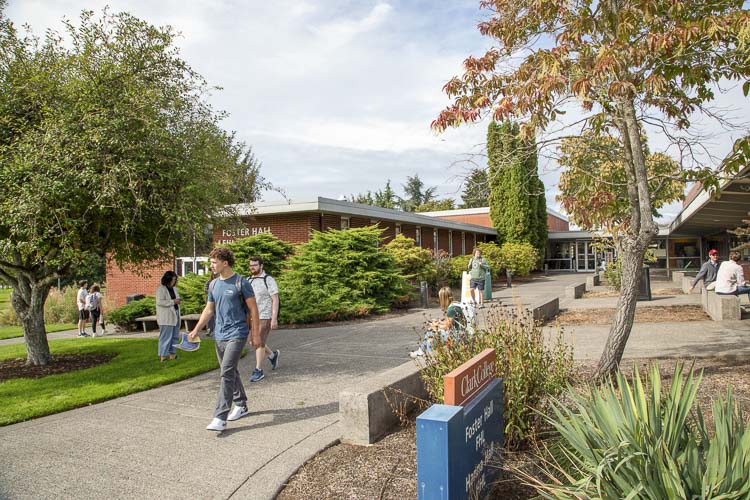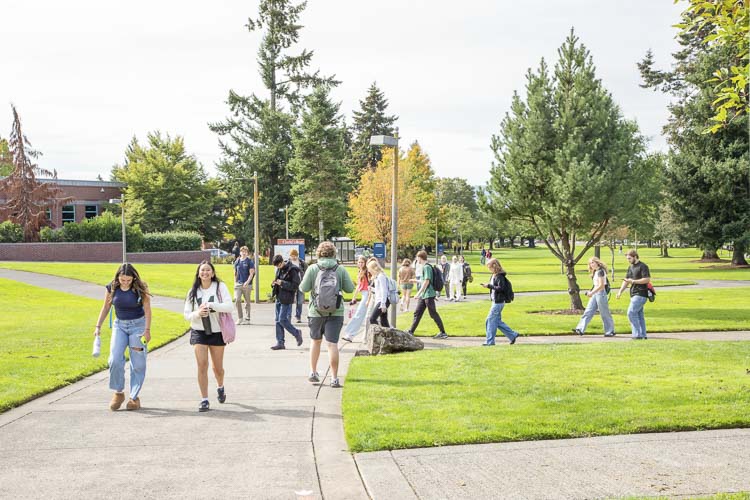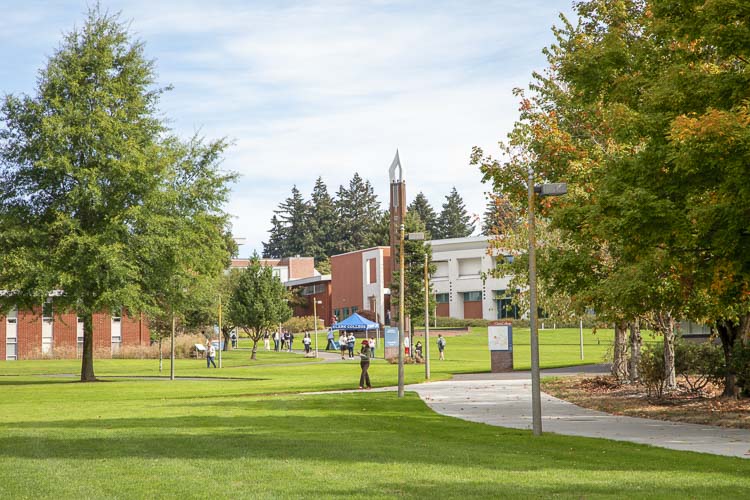
Almost 6 percent increase in students compared to fall 2023
VANCOUVER — Clark College continues to see an increase in enrollment across all categories. At its Oct. 16 board of trustees work session, the college announced a 5.8% increase in total unduplicated headcount compared to fall 2023, and a 16.8% increase between fall 2022 and fall 2024. The college released its official enrollment numbers at the end of the 10th day of class of the fall term on Oct. 4.
Clark College enrolled a total of 8,651 students during fall 2024 term. This translated to the full time equivalent (FTE) enrollment numbers at 6,164. Additionally, 879 students are enrolled in community and continuing education classes.
In fall 2020, early in the pandemic, enrollment at community colleges nationwide—including Clark—dropped sharply. Since then, enrollment at Clark and other community colleges has experienced an uptick. Clark’s enrollment increased by more than 10% in fall 2023.
Enrollment numbers are provided by the Washington State Board for Community and Technical Colleges (SBCTC), which tracks enrollment data for the 34 public colleges in its system.

Clark College President Dr. Karin Edwards said, “I am so pleased to see our enrollment numbers continue to climb. Our numbers are up in every category: students planning to transfer to a four-year institution, Running Start, international, and those pursuing a bachelor’s degree on our campus. It’s good news all around for Clark College.”
She added, “A notable 47.1% of our students are in the first generation of their family to attend college and 39.1% of our students are 25 or older. Clark is a great place for people to embark on a new career pathway, get a fresh start, and find help along their educational journey.”
Notable Stats & Trends
Enrollment: (unduplicated)
- Largest enrollment (both headcount and FTEs) since the pandemic
- 5.8% enrollment increase in headcount from fall 2023
- 16.8% enrollment increase in headcount over past two years (fall 2022 to fall 2024)
- 188 students are pursuing Bachelor of Applied Science degrees at Clark,
up 21% from fall 2023 - 56 International Programs students, a 9% increase from fall 2023
Modality: Similar to 2023, students are taking a mix of online and in-person classes on campus. We are seeing additional students on campus with more clubs and activities.
- 7,358 in person (duplicated)
- 10,817 online (duplicated)
- 4,300 hybrid (mixture of in-person and online) (duplicated)
Student type: (unduplicated)
- 51.8% part time; 48.2% full time
- 47.1% are first-generation college students
- 23.1% are Running Start students
Program type: More than half (55%) of students are pursuing a transfer degree and plan to earn a bachelor’s degree at a four-year institution; this is consistent with fall 2023 numbers.
- 55.1% pursuing transfer degree
- 19.7% enrolled in Career Technical Education (CTE) programs (automotive, diesel, welding, mechatronics, cuisine, professional baking, etc.)
- 13.7% enrolled in Transitional Studies courses (Basic Adult Education, GED preparation, English as a Second Language, high school plus)

Running Start students: Comprised of 23.1% of the total student body.
- 1,695 enrolled FTEs, an 6.7% increase from fall 2023
- Top five school districts with Running Start students attending Clark College fall 2024: Evergreen, 533 students; Vancouver, 504 students; Battle Ground, 442 students; Camas, 224 students and Washougal, 124 students
Student veterans:
- 792 veteran students and military-affiliated students (children and spouses of veterans)
- 257 of these students are using VA benefits
Student residence:
- 91% Clark County, Wash.
- 5% other Wash. or Ore.
- 4% other
Student age:
- 60.9% age 24 or young
- 39.1% age 25 or older
Student race/ethnicity (in alphabetical order); in most categories, closely mirrors Clark County demographics.
- 6.7% Asian
- 2.8% Black/African American
- 0.7% Hawaiian/Pacific Islander
- 11.0% Latinx
- 13.9% Multiracial
- 0.3% Native American
- 57.5% White
- 7.0% Not reported
Student gender:
- 55.4% Female
- 33.4% Male
- 0.8% Nonbinary
- 10.3% Not reported
Despite challenges of rolling out the updated Free Application for Federal Student Aid (FAFSA) at the federal level, Clark’s financial aid office has verified and processed more than $7.32 million in financial aid grants and loans to our students fall term. This does not include $2.4 million from other sources for scholarships, veterans, and workforce education.
Dr. William “Terry” Brown, Clark’s Vice President of Instruction, attributes the college’s continued growth trajectory to its dedicated faculty and staff who provide students with a high-quality educational experience and who listen and respond to what the community wants and needs. “When our community asked for a bachelor’s program to train teachers, we delivered — and our first cohort graduated in June. Then our community asked for a two-year program to train surgical technicians, and we are developing that program now. We are committed to training tomorrow’s workforce in Clark County for in-demand, living-wage jobs.”
About Washington SBCTC
The Washington State Board for Community and Technical Colleges (SBCTC) makes higher education accessible and affordable by advocating, coordinating, and directing Washington state’s system of 34 public community and technical colleges. SBCTC collectively serves over 262,000 students each year, which makes it the largest system of public higher education in Washington. They serve over 50% of students of color. They are accessible, affordable, and connected to K-12 schools, universities, and employers.
About Clark College
Founded in 1933, Clark College is Southwest Washington’s largest public institution of higher education and serves over 8,000 students per term. Clark College provides residents of Southwest Washington with affordable, high-quality academic and technical education.
Clark College offers more than 100 degree and certificate programs, including bachelor’s and associate degrees; professional certificates; high school diplomas and GED preparation; and non-credit community and continuing education. Clark serves a wide range of students including high school students, displaced workers, veterans, parents, non-native English speakers, and mature learners. Approximately 47% of its students are in the first generation of their families to attend college.
Information provided by Clark College Communications.
Also read:
- Opinion: In-n-Out Burger is so much more than fast food for so many of usPaul Valencia shares why In-n-Out Burger means more than just fast food for countless fans as Ridgefield nears its grand opening and Vancouver’s location begins construction.
- Obituary: Stephen Lloyd Randol, 1945-2025Stephen Randol, a Clark County resident for over 80 years, passed away on June 15. A celebration of life is scheduled for July 26 at Northcrest Community Church in Vancouver.
- Opinion: Washington’s June 2025 budget revisions – revenue up spending up moreMark Harmsworth of the Washington Policy Center critiques the state’s latest budget revisions, warning that new taxes—not organic growth—are driving revenue. He calls for fiscal restraint and long-term reform.
- Washougal fourth graders take flight with hands-on birdhouse projectFourth-grade students in Washougal connected science, math, and hands-on skills through a district-wide birdhouse building project supported by high school mentors and community volunteers.
- Opinion: Pedestrian control signalsDoug Dahl explains Washington state law regarding crosswalks and pedestrian signals, offering safety insights and common misunderstandings about traffic control at intersection
- Letter: ‘How can five part-time legislators without research support or reliable access to information serve as an effective check on six full-time elected executives’Bob Zak expresses agreement with recent opinions on the Clark County Charter’s imbalance and endorses John Ley’s transit preference while questioning light rail costs and Council effectiveness.
- Cowlitz Indian Tribe and Columbia River Mental Health Services announce Letter of Intent to protect behavioral health servicesThe Cowlitz Indian Tribe and Columbia River Mental Health Services signed a letter of intent to transition behavioral health services under the Tribe’s care, ensuring service continuity across Southwest Washington.











